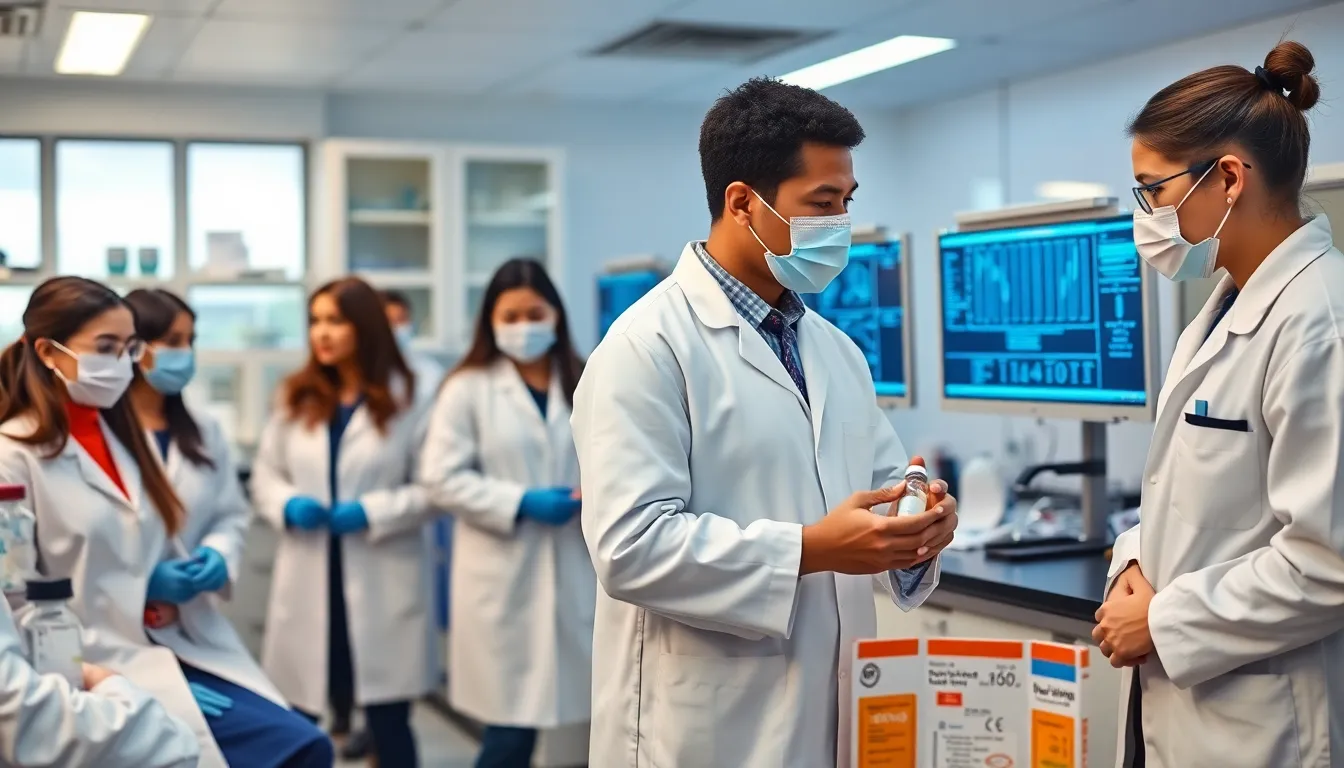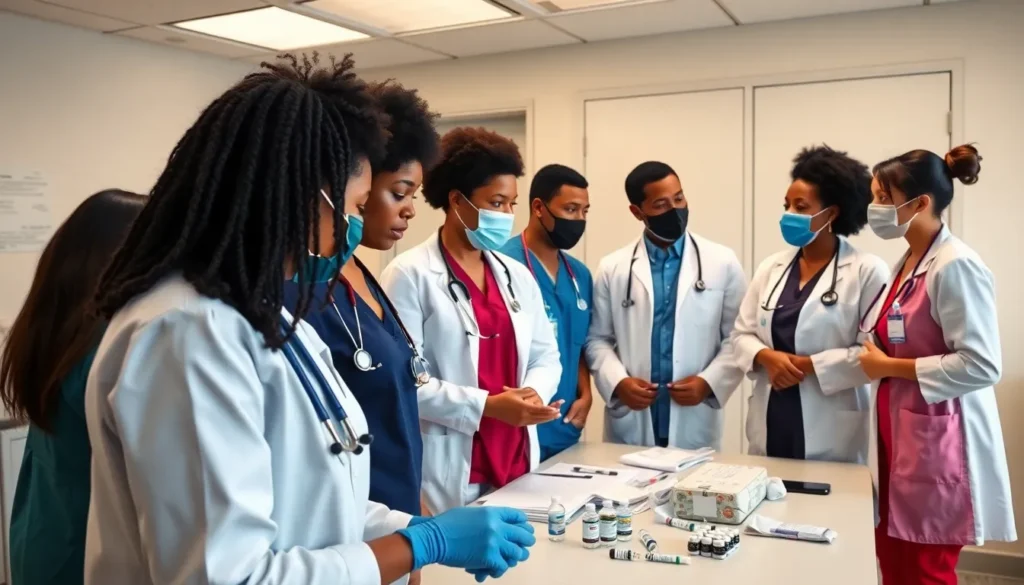In a world where superheroes save the day, vaccines stand out as the unsung heroes of public health. They come armed with tiny vials packed with the power to protect against diseases that once wreaked havoc on communities. But just like any good superhero, they need to undergo rigorous training—also known as testing—to ensure they’re ready for action.
Ensuring vaccine safety isn’t just a science; it’s an art form that requires precision and care. From the lab to the clinic, every step is carefully monitored to keep the public safe. So, whether you’re a vaccine enthusiast or just someone looking to dodge the flu this season, understanding the safety measures in place can put your mind at ease. After all, a healthy society is a happy society, and who wouldn’t want to be part of that?
Table of Contents
ToggleUnderstanding Vaccine Safety
Vaccine safety plays a vital role in public health. Continuous monitoring and rigorous testing assure stakeholders of vaccine efficacy and safety.
Importance of Vaccine Safety
Ensuring vaccine safety is paramount. Vaccines prevent outbreaks and protect vulnerable populations, including infants and the elderly. The World Health Organization states that safe vaccines save 2 to 3 million lives annually. Confidence in vaccines fosters community immunity, reducing disease spread. Strong safety protocols enhance trust between healthcare providers and the public.
Common Concerns About Vaccines
Concerns about vaccines often arise. Parents frequently worry about potential side effects, fearing they may outweigh the benefits. While mild reactions, like soreness or fever, can occur, serious adverse effects remain extremely rare. Misinformation spreads easily, leading to confusion about vaccine ingredients and effectiveness. Public health agencies provide reliable information that addresses these concerns directly. By understanding vaccine safety, individuals can make informed decisions regarding their health and the health of their families.
Key Principles of Vaccine Safety

Vaccine safety relies on strict protocols throughout the approval and monitoring processes. Prioritizing these principles ensures effective protection against diseases.
Pre-Approval Testing
Vaccine development begins with extensive pre-approval testing. Researchers conduct laboratory studies to evaluate immune responses before human trials. These clinical trials, encompassing three phases, involve thousands of participants. In phase one, small groups receive the vaccine to assess safety and dosage. Phase two expands the study to additional participants, focusing on efficacy. Phase three involves large-scale trials comparing vaccinated individuals against a control group. Only after demonstrating safety and effectiveness do regulatory agencies approve a vaccine for public use.
Post-Marketing Surveillance
Monitoring continues once the vaccine enters the market. Post-marketing surveillance identifies any rare side effects that may not surface during clinical trials. Healthcare providers report adverse events to systems like the Vaccine Adverse Event Reporting System (VAERS). These ongoing evaluations help ensure vaccine safety as they track real-world effects among diverse populations. Continuous data collection informs public health responses and maintains public trust in vaccination programs. Safe vaccines contribute to community immunity, decreasing the risk of outbreaks.
Best Practices for Ensuring Vaccine Safety
Ensuring vaccine safety involves several best practices that healthcare providers and organizations should follow.
Inventory Management
Maintaining a precise inventory of vaccines is crucial for safety. Tracking expiration dates ensures only viable vaccines are administered. Proper storage conditions prevent temperature fluctuations that could compromise vaccine efficacy. Regularly auditing vaccine supply helps identify discrepancies and maintain accurate records. Utilizing an electronic inventory system can streamline this process, minimizing human error and enhancing accountability.
Proper Administration Techniques
Following proper administration techniques is essential for vaccine safety. Ensuring that staff is well trained in injection techniques reduces the risk of complications. Administering vaccines in the correct anatomical site enhances absorption and effectiveness. Monitoring patients post-vaccination allows for immediate intervention in case of an adverse reaction. Following manufacturer guidelines ensures compliance with safety protocols, contributing to overall public confidence in vaccination efforts.
Role of Healthcare Professionals
Healthcare professionals play a critical role in ensuring vaccine safety through education and monitoring practices.
Educating Patients
Educating patients about vaccines forms the foundation of public trust and acceptance. Information about vaccine benefits and potential side effects empowers individuals to make informed decisions. Healthcare providers should communicate openly, addressing concerns with evidence-based data. Resources like brochures and websites improve understanding while fostering confidence. Engaging discussions during consultations create opportunities for questions, reinforcing the relationship between patient and provider. Staff training enhances the delivery of vaccine information, ensuring clarity and reliability. Informed patients are more likely to participate in vaccination programs, contributing to community immunity.
Monitoring Adverse Effects
Monitoring adverse effects of vaccines is crucial for ongoing safety evaluations. After vaccination, healthcare professionals remain vigilant for any unexpected reactions. Reporting any adverse incidents through established systems like the Vaccine Adverse Event Reporting System (VAERS) guarantees transparency and accountability. Data collected from these reports helps identify rare side effects and establishes patterns that assist in public health decisions. Regular follow-ups with patients support early detection of issues, ensuring prompt intervention if necessary. By prioritizing adverse effect monitoring, healthcare professionals uphold vaccine integrity and maintain public confidence in immunization efforts.
The commitment to vaccine safety is paramount in fostering public health and trust. By adhering to rigorous testing protocols and ongoing monitoring, healthcare professionals can ensure that vaccines remain effective and safe for everyone. This vigilance not only protects individuals but also fortifies community immunity, significantly reducing the risk of outbreaks.
Addressing concerns with clear communication and evidence-based information helps demystify vaccines for the public. As healthcare providers continue to educate and monitor, they play a crucial role in maintaining confidence in vaccination programs. Ultimately, the dedication to ensuring vaccine safety contributes to a healthier society and a brighter future for all.










